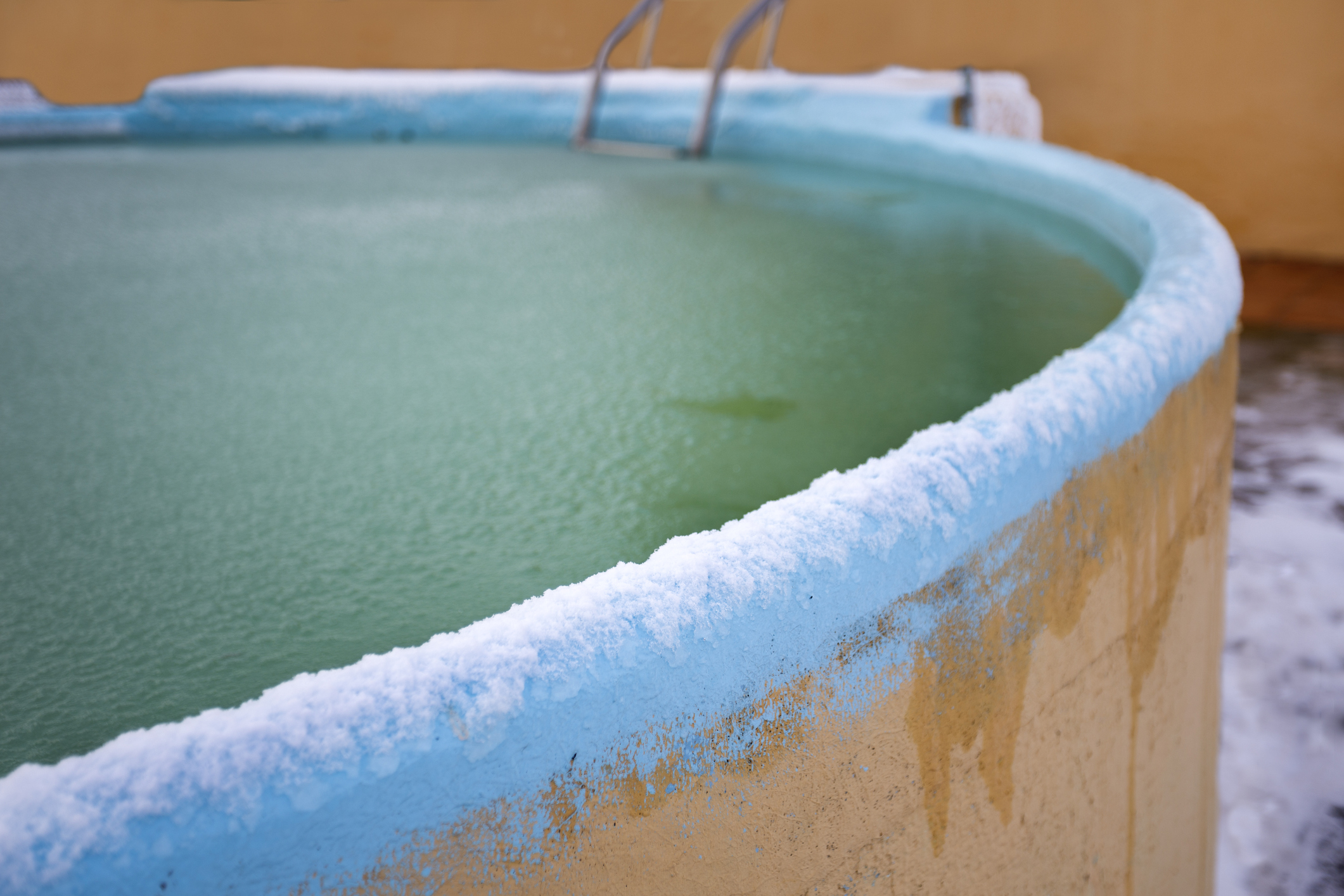
Protect Your Pool From Freezing: Essential Tips for Pool Owners
Winterizing your pool may feel daunting, especially during the offseason. However, investing time in winterization can spare you the headache of dealing with potentially costly repairs when pool season rolls around.
Protecting your pool from freezing temperatures is essential. With helpful pool care knowledge and a proactive approach, you can safeguard your pool and preserve its integrity throughout the colder season.
Understanding Freezing Risks
Understanding why your pool might freeze is the first step toward prevention. Freezing occurs when the temperature drops low enough for the water in your pool to solidify, typically around 32° F. Many pool owners don’t realize that it’s not just the water freezing that’s the issue. It’s the expansive force of the ice that can do real damage.
Factors That Contribute to Freezing
Several variables can contribute to the likelihood of finding your swimming pool frozen one winter morning:
- Geographic location. Those living in cooler climates or at higher altitudes are more at risk.
- Exposure to wind. Pools in windier areas tend to cool faster.
- The unpredictability of the Sun Belt states. Even in regions with warmer winters, sudden temperature drops can still occur. In fact, there have been several freeze events throughout Texas in recent years.
Consequences of Freezing on Pool Infrastructure
When water freezes, its volume increases. So when it’s in a confined space like a pool’s pump and circulation system, this expansion can cause:
- Burst pipes. The pressure can be immense, leading to bursts in the piping.
- Damage to pool structure. Ice can push against the walls of your pool, causing cracks.
- Ruined pool equipment. Items like pumps, heaters, and filters may not withstand the pressure, rendering them useless.
Preventive Measures
It’s always wise to prevent problems before they occur, especially when maintaining your pool. Dealing with a frozen swimming pool can be a major hassle, so it’s essential to understand the primary steps to protecting it from winter’s challenges.
Using Pool Covers
Pool covers are a straightforward and effective way to maintain cleanliness, limit temperature loss, and prevent debris from falling in your pool. When choosing a pool cover, ensure it is for winter use in your climate.
Insulating Pipes and Equipment
For pools in areas prone to extreme cold, insulating the pipes with foam covers can help them retain heat during unexpected temperature drops.
Monitoring Water Levels
Keep an eye on your pool water level, particularly after heavy rains, or use a safety cover that automatically drains water. You should know the recommended water level for winter, as this can help distribute the ice’s weight evenly and protect pool walls and floors.
Ways To Winterize a Pool in the Sun Belt States
The appropriate approach to winter pool maintenance depends on the severity of winter conditions in your area. A straightforward method involves covering the pool while maintaining minimal daily filtration and chemical treatments. For those seeking a more comprehensive solution, partial or complete winterization procedures can protect your pool during colder months if you don’t plan to use it.
Cover and Continue
The first method to winterize a Sun Belt pool involves covering it with a winter pool cover and reducing operating hours. Utilize a tight-fitting mesh safety pool cover to effectively block sunlight and minimize the need for additional sanitizers or algicides while allowing rain and snowmelt to pass through without requiring a cover pump.
Partial Winterization
Ensure the water is tested and balanced, and shock it according to the manufacturer’s instructions. Backwash the pool filter and lower the water level below the skimmer opening using the main drain or a submersible pump.
Tighten the pool cover securely, use a small pump to eliminate standing water for solid covers, or maintain the water level below the tile for mesh safety covers. Drain equipment such as the pump, filter, heater, and aboveground pipes while removing chlorine from chlorinators and adding pool antifreeze to the skimmer line before plugging it.
Winter Maintenance Tips
Preventive measures set the defensive line, but winter maintenance ensures they firm against the outdoor conditions. Here are some tips to keep your pool protected during the winter months.
Regular Inspection and Cleaning
Perform routine checks on your pool to ensure all is as it should be. Snow and ice can shift covers or damage the finishing of your pool, which can lead to issues when the season changes.
Addressing Ice Buildup and Snow Removal
Excessive ice on the pool’s surface can be a sign of freezing. Actively look for any signs of this and carefully remove it if possible to avoid damage to the pool surfaces.
Monitoring Chemical Levels
Even if you’re not swimming, maintaining the correct chemical balance in your pool’s water is crucial. It protects your pool from corrosion and algae growth from stagnant water.
Extend Your Swim Season
If you’re keen on enjoying your swimming pool throughout the winter months, weather permitting, think about installing a pool heater. Pool heating unlocks a world of possibilities for year-round swimming and poolside enjoyment with loved ones all year, creating lasting memories.
A heated pool liberates you from seasonal swimming constraints, offering comfortable pool time regardless of the month. It creates the perfect environment for unforgettable pool parties and gatherings, even when the temperatures drop.
Enjoy Your Swimming Pool All Year Long With SPS PoolCare
Your pool is an investment that requires attention and care, especially during the winter season. By understanding the risks, taking preventive measures, and committing to winter maintenance, you can ensure a long life for your pool. Protecting your pool from freezing is about more than just equipment. It’s about maintaining the sanctuary of serenity in your backyard, a space that brings joy and calm each season.
For hassle-free pool cleaning and maintenance services, turn to SPS PoolCare today, named the number one pool service company in the United States. Contact your local SPS PoolCare branch today, and a professional team of experts will take care of your pool for you!


